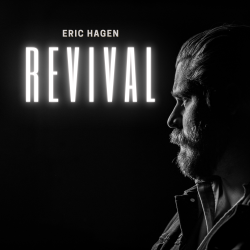‘Revival’ is an album to be savored for its beauty and its pain.
 Eric Hagen’s songs are like Edward Hopper’s paintings. They invoke alienation and pain in ways that are both disturbing and beautiful. As American Studies professor James Peacock has written, “The haunting power of Hopper’s art derives from his particular brand of realism, one which is sparse, disinclined toward extraneous detail and, ultimately, characterized by what the painting seems to omit rather than what it represents.” This also applies to Hagen’s songs. ‘Revival’s’ orchestration is spare; drums, guitar, and bass to do the heavy lifting while organ and violins make a brief appearance. Yet these songs are emotionally complex. Hopper’s paintings too had an “apparent simplicity” behind which “lies great complexity and depth,” as Peacock noted, with the lack of detail inviting “the spectator to complete the image by speculating on past and impending events, on the relationships between the characters”.
Eric Hagen’s songs are like Edward Hopper’s paintings. They invoke alienation and pain in ways that are both disturbing and beautiful. As American Studies professor James Peacock has written, “The haunting power of Hopper’s art derives from his particular brand of realism, one which is sparse, disinclined toward extraneous detail and, ultimately, characterized by what the painting seems to omit rather than what it represents.” This also applies to Hagen’s songs. ‘Revival’s’ orchestration is spare; drums, guitar, and bass to do the heavy lifting while organ and violins make a brief appearance. Yet these songs are emotionally complex. Hopper’s paintings too had an “apparent simplicity” behind which “lies great complexity and depth,” as Peacock noted, with the lack of detail inviting “the spectator to complete the image by speculating on past and impending events, on the relationships between the characters”.
The lyrics in Hagen’s songs provide just enough detail to serve as an invitation to the listener to fill in the gaps. These songs could be used as a soundtrack for listeners’ own disappointments.
Sometimes, there is an even closer overlap between Hagen and Hopper’s art. ‘Dying Along’ could be describing the couple in Hopper’s ‘Summer Evening’ with Hagen singing ‘‘I thought we had love yet between us,/ You know it’s something to tend like a rose,/ But just cuz the bloom is unseen doesn’t mean that,/ The flower it ain’t gonna grow,/ Can’t we keep trying, it’s better than dying.”
There is a sense of intimacy but also alienation in both artists’ work. One source of Hagen’s intimacy is his voice. Reading his lyrics is little indication of how deeply personal are his songs. He brings out all the pain and loss through the vocals. The alienation is because he doesn’t give us any way to relieve the pain or make up the loss. The closest he comes is in ‘Wake Up’ which calls for tough self-improvement measures: ‘Dug your own grave\Here it is now\it’s your life to save.’
The emotion is matched by the music. Hagen has mined the veins that provide the ore, the raw material for Americana – blues, rock, folk and country. But this isn’t a check-the-box exercise. Hagen has the musical skill to match the sounds with the song. The album opens with drums, then bass and then the organ comes in to create a classic sound for the song ‘Cold Heart’. The next song, ‘Cigarette’, leads with acoustic guitar, joined by electric and slide guitar, which perfectly matches the images of ‘I’ll have no last regret/Just a dose and a cigarette.’ Even the duet with Margo Hansen doesn’t lighten things up with ‘Dyin Alone’. The only more heavily orchestrated number is Hagen’s cover of Fleetwood Mac’s ‘Dreams’ and his manages to make it all his.
Like Hopper’s ‘Nighthawks at the Diner’, ‘Revival’ is emotionally challenging and beautiful. Savour this album slowly, first listening to the careful mixture of music and mood, then allowing yourself to be moved by the memories it revives while marvelling at the magic of the man who put it all together.


